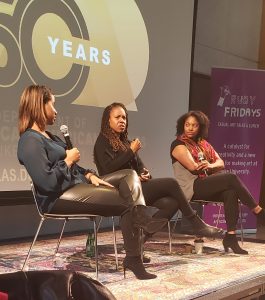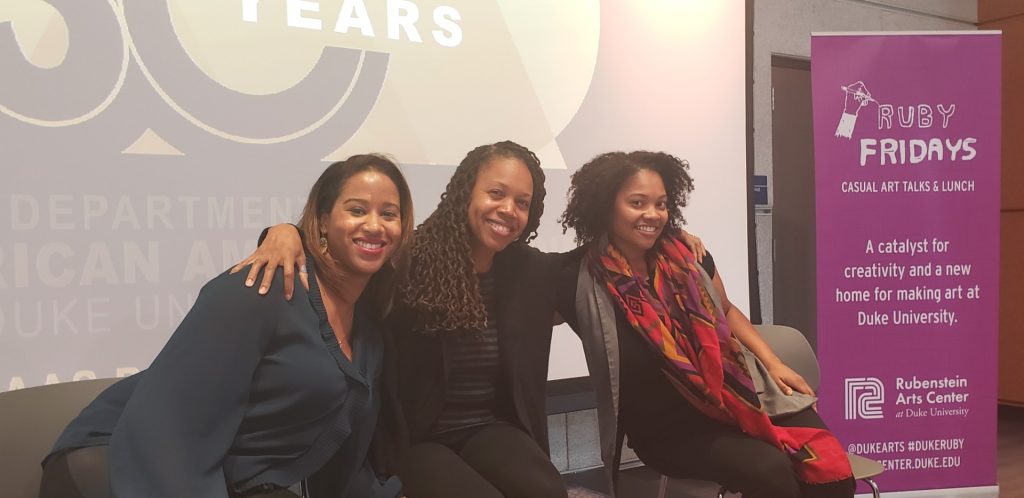 Three black women artists, members of the vibrant and supportive Durham arts community, shared details of their creative practices, and the challenges and joys of being working artists at a Nov. 15 “Ruby Fridays” event.
Three black women artists, members of the vibrant and supportive Durham arts community, shared details of their creative practices, and the challenges and joys of being working artists at a Nov. 15 “Ruby Fridays” event.
Durham-based visual artists Candy Carver and Natasha Powell Walker, and independent filmmaker Natalie Bullock Brown joined Mark Anthony Neal, the James B. Duke Professor of African & African American Studies, for a lunchtime public conversation in the Ruby Lounge at the Rubenstein Arts Center.
The event was held in conjunction with the 50th anniversary of the Department of African & African American Studies.
On being a working artist and having “day jobs”:
WALKER: I just got comfortable telling people at my nonprofit “day job” that I’m an artist. It’s easier at a nonprofit where people have lives. It’s been interesting to see how much they intersect, my “day job” and my art.
BROWN: My parents were supportive. They said make sure you get an advanced degree. I had worked on the Ken Burns Jazz series. I was really worried at age 27 that if I didn’t get married soon, I would not have kids. I left New York and moved here. I now have 2 children and I am married. I just got back to filmmaking about 6 years ago. I started teaching, mostly because I had flexibility with my schedule.
Every waking moment is teaching, filmmaking, kids. It’s challenging.
The funding part, in N.C., I have not figured that out yet. I’m 6 years into a project that I could have done in 3 years in New York.
CARVER: I don’t have a 9-to-5 but I work all the time. It’s fun.
I actually work more than 9-to-5. It’s more than a full-time job, if we’re talking about 40 hours a week. My job can travel with me. I have a lot more flexibility than a 9-to-5. I’m currently figuring out balance, and opportunities that won’t cost me time. I need to be happy to make good work, unlike Mary J. Blige.
 On the challenges of being an artist in the Triangle area:
On the challenges of being an artist in the Triangle area:
CARVER: There’s a challenge that many of the art galleries are run by white women and that’s a particular perspective that they are choosing art from.
As our area becomes more diverse they will have to seek from a more diverse spectrum of creativity. Black life is way more interesting than shackles, chains and lunch counters. It’s more interesting and it’s broader.
On being taken seriously as women:
WALKER: I’ve experienced harassment. I’ve had both male and female mentors tell me to use it to my advantage, or that’s just the way it is.
CARVER: The majority of my clients are men. Why? I would have thought it would be more women. I’m not sure why. But I’m comfortable with guys. Always have been.
BROWN: Women don’t get as much funding as men. You might have to work on projects where you’re token, or the topic is black and you’re being used for your blackness.
It doesn’t matter if you went to film school. What matters is experience. I want the chance to do artwork that will help me to grow.
On where they create:
WALKER: I like creating at home. I don’t like people walking up to me while I’m creating. I had a studio space in Richmond that I shared.
CARVER: The whole downstairs of my house is an art studio. My dining room and living room are full of art supplies. I’m social, dialoguing doesn’t disrupt me too much. I actually enjoy it. I paint on the floor. It feels nice. I’ve painted on the walls. My mother learned pretty early that I was a different kind of kid.
What will you be doing 5 years from now?
CARVER: That’s so limiting. If I had done what I thought 5 years ago I would have missed out on so much.
I’m working on figuring out ways to make more money and work less.
On “black girl magic”:
CARVER: It’s the ability to pivot, to constantly and successfully adjust.
BROWN: It agree that it is being able to react in the moment to what is needed. It’s being able to have joy in the midst of all of the challenges. Also, it has begun to encapsulate this idea of being a superwoman, which is not real, not healthy, not sustainable.
Magic has be paid, funded, supported or it will fizzle.





